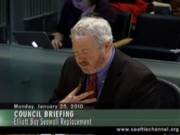 The rusting husk of Gasworks Park, a fitting metaphor for our elected government. Photo by our Flickr pool contributor feekner.
The rusting husk of Gasworks Park, a fitting metaphor for our elected government. Photo by our Flickr pool contributor feekner.
Late last month, I wrote about Oregon's special vote for Measures 66 and 67, two bills passed by the legislature and signed by the governor that were sent to the voters as a referendum, which raised taxes to help close a budget shortfall. One raised the minimum corporate tax for the first time since 1931, while the other was a modest increase in the income tax for high-earners (Oregon has an income tax but no sales tax). Both measures passed with substantial margins, with roughly 54 percent in favor to 46 percent opposed.
The vote was closely watched nationally because Oregon, like Washington, is a state known for its anti-tax fervor. Oregon had its own Tim Eyman, has caps on property tax increases, and has repeatedly rejected new tax increases. But faced with dramatic cuts to crucial services, Oregon voters banded together with their elected representatives and passed two very simple measures that kept the state working.
Our fearless leaders in Olympia, on the other hand, have done virtually nothing. While Gregoire has stated she wants to "buy back" some of the slash-and-burn budget cuts she originally proposed (as a matter of state law, which requires her to present a balanced budget--from the beginning, she made clear she did not support that budget), her alternate budget still relies extensively on cuts, with a large portion of new revenue expected from federal stimulus money. The House has introduced a bill (HB 3176) that would generate $210 million in new tax revenues by mostly closing loopholes, but that's a pittance compared to the overall $2.6 billion shortfall over the biennium....
Kaori Nakamura of Whim W'Him. Photo by Marc von Borstel.
It feels completely redundant to heap more praise on Olivier Wevers at this point, since nearly everyone else has been in a full-blown love-fest since his new company Whim W'Him's sold-out debut this last weekend at On the Boards. But as much as I'd love to be the odd man out in this orgy of praise, I just can't: Wevers & co. delivered a pretty stunning evening of dance that was at once accessible and charming as well as subtle and thoughtful.The evening was split between two shorter works that have been presented before—X stasis, part of PNB's 2006 Choreographer's Showcase, and FRAGMENTS, created for Spectrum's Studio Series in 2007—and the premiere of 3Seasons, a new work set to Vivaldi's Four Seasons, with a bit of pure chance thrown in: each night, one of the seasons was swapped for an original composition, based on Vivaldi's structures, by local composer Byron Au Yong.
The word most frequently used to describe Wevers' choreography is "whimsical" (hence the company name, I assume), and that's definitely true. His vocabulary is primarily balletic, but looser and informed by contemporary dance, and lets the personality of the dancers shine through. Half the charm comes from the expressions on the dancers' faces, which isn't something you normally associate with ballet, not least because PNB's house is too large for the audience to see them. Comparatively, OtB's mainstage was downright intimate.
For instance, FRAGMENTS opens with a duet between Kelly Ann Barton and Vincent Lopez, both in tutus, lip-syncing to opera. Largely they perform the same movements, but Lopez, exaggerating a coquettish expression, comes off as aping the (sometimes) more serious Barton. But FRAGMENTS also shows off Wevers' ability to create powerful drama. The fourth suite, a solo by Lopez set to Mozart's Requiem, ends with the dancer contorted on the ground, back arched, caught somewhere between agony and ecstasy. The finely sculptured tableau is a powerful and beautiful image, achieved with neither the humor nor the light, athletic movements that are generally associated with Wevers' work....
 Trees at risk: each year, 200,000 trees just like the ones in this grove, go to the blade for junk mail.
Trees at risk: each year, 200,000 trees just like the ones in this grove, go to the blade for junk mail.
When the U.S. Congress passed the National-Do-Not-Call-Registry into law in 2003, and improved it in 2007, it became one of the most popular government programs in our nation's history. Almost overnight, the Registry stopped millions of obnoxious calls from interrupting the average American's dinner or Saturday morning sleep-ins. It wiped out the most intrusive, unwanted, and annoying communications development since Alexander Graham Bell implored Watson to "Come here, I want to see you."
I say nearly, because the DNCR left a few loopholes that continue to annoy us all. Exemptions for non-profit organizations and political calls continue to be allowed. This is a problem, but make no mistake: The Registry has been a stunning success that's allowed many of us the chance to eat our meals in peace.
Now the Seattle City Council has the chance to right a litany of wrongs when they vote on a resolution to petition the state legislature to ban junk mail. The council will vote for the resolution to create a Do-Not-Mail-Registry on January 11.
I could reel off a massive list of environmental reasons it's a good idea. The appropriately, and somewhat humorously-named group ForestEthics sent around a blast email to local media chock full of the "environmental impacts" of the local junk mail trade. For the ultimate guilt trip, consider these factoids:
- Almost 200,000 trees are cut for Seattle's junk mail every year
- Junk mail sent to Seatteites causes global warming gases equal to almost 6,000 cars, due to logging and industrial emissions
- It costs more than $400,000 a year to dispose of Seattle's junk mail.
That cleanup total, by the way, is paid by us through taxes. So every day my wife pulls the junk mail out of the mailbox and throws it into the recycle bin in one deft move, it's costing us money....
Regular readers of The SunBreak are aware that a friend of mine had a traumatic roll-of-quarters experience with the Chase branch in the University District, back in November:
He stopped by the branch in the University Village to pick up a roll of quarters because he's paranoid about using his credit card in parking meters. He bought a roll for ten dollars, stepped outside to open up the roll, and discovered that he'd also bought a number of dimes, nickels, pennies, and Phillipine centavos.
As it happened, this week brought a return visit to the same branch (via drive-thru) for quarters. The teller proffered (via the drive-thru transport device) one of the self-packed rolls that customers bring in, and my friend, remembering his last experience, balked.
"Can you open it?" he asked. Behind the window, the teller gave him a look that translated as, "Um--no!" He explained that he only asked because of the last time with the centavos. "The last time, you guys said if I left with the quarters, it was my responsibility." The teller agreed it was. "Can I just get one of the machine-filled rolls?" The teller was disinclined to acquiesce....
 (via TechFlash) All over the Pacific Northwest this morning, PR professionals glanced through the New York Times and thought, "Hey, Microsoft got a hit!" Then they realized that a hit had been done on Microsoft and they prepared for a round of stomach-churning conference calls.
(via TechFlash) All over the Pacific Northwest this morning, PR professionals glanced through the New York Times and thought, "Hey, Microsoft got a hit!" Then they realized that a hit had been done on Microsoft and they prepared for a round of stomach-churning conference calls.
Dick Brass, a VP with Microsoft for seven years, until 2004, wrote this about his former employer:
The problem comes when the competition becomes uncontrolled and destructive. At Microsoft, it has created a dysfunctional corporate culture in which the big established groups are allowed to prey upon emerging teams, belittle their efforts, compete unfairly against them for resources, and over time hector them out of existence. It's not an accident that almost all the executives in charge of Microsoft's music, e-books, phone, online, search, and tablet efforts over the past decade have left.
Apologists will have plenty of countercharges to make against Brass or his claims, but this element of Microsoft's culture is well known, and remonstrating with people who mention it is just evidence of Microsoft's inability to see and critique its behavior....
Back in the 1970s, low-budget filmmakers pushed the envelope 'til it ripped asunder, parlaying extreme sex, violence, political incorrectness, and mountains of Just Plain Strange before the disbelieving eyes of theater and drive-in audiences the world over.
That reckless maverick spirit's been largely neutered from modern cinema: Multiplexes of the 21st century brim with sanitized, corporate-endorsed product, and reality TV serves as the watered-down virgin cocktail substitute for the megawatt absinthe that was Bell-Bottom-Era Grindhouse Fare. But that spirit of yore's not totally dead as long as director Frank Henenlotter lives.
Henenlotter's been cooking up his own brand of bizarre, extreme, and often grotesquely-hilarious horror/exploitation for quite some time. A child of the epicenter of the Grindhouse (New York's pre-Disneyfied 42nd Street), Henenlotter channeled his own love for the base and the bizarre into cult classics like Basket Case (the story of a cannibalistic Siamese twin who resides in a wicker basket, and the brother who loves him) and Frankenhooker (now that's a title, friends)....
Bart Sher (Photo: Team Photogenic)
Saturday night Bart Sher had the Tom Sawyer-esque experience, he said, of attending his own funeral. The occasion was "A Bash for Bart," a gala in celebration of his decade with Intiman--the title of which he confessed to some ambivalence about, as someone who'd had his skull fractured by a baseball bat as a child. The establishment of a Bartlett Sher Artistic Fund, funded by $2,500-per-couple plates at a Tom Douglas-hosted dinner, made it an august evening indeed.
Laurence Ballard was spirited up from Savannah, Georgia, to deliver an erudite envoi to Sher's 16-play stint: Namaste Man, The Skin of Our Teeth, Uncle Vanya, Prayer for my Enemy, Richard III, Three Sisters, Singing Forest, Our Town, Nora, Homebody/Kabul, Titus Andronicus, Arms and the Man, Nickel and Dimed, Cymbeline, The Dying Gaul, and Servant of Two Masters. (Misha Berson recaps the years here.)
"Woe," pronounced Ballard, to the actor who encounters Sher unprepared. And woe of a different sort to the actor who has prepared but has made stupid choices.
Broadway's Kelli O'Hara (from Sher's Light in the Piazza and South Pacific) sang, and literally kicked off her shoes. (Who knew Harry Connick, Jr., had done an arrangement of Piazza's "Fable"?) Ida Cole--the philanthropist who saved the Paramount and its Mighty Wurlitzer Organ for us--wished the Shers well, and reminisced about her former neighbors, saying they'd become family.
It was sweet--you got the feeling Bart would not sit still for cloying--and respectful, a paying of tribute to an artistic director who, these days, cannot be hired enough in New York, whether it's for theatre (Odets at Lincoln Center), musical theatre (Broadway's South Pacific), or opera (he passed the Met audition handily with Barber of Seville).
"Somewhat eclipsed by his recent successes in New York...," says the 2008 New York Times Magazine profile, "is the fact that he remains artistic director of the Intiman Theater in Seattle, a job he has held since 2000 and has done sparklingly enough to help the Intiman earn the 2006 Tony for Outstanding Regional Theater." (Predictably, they get Intiman's full name wrong: it's Intiman Theatre.)...
the department of safety, courtesy of their flickr
On Saturday, the Department of Safety ends its long run with performances by Phil Elverum, Lake, Karl Blau, and Arrington de Dionyso. Started in Anacortes in 2002 by four ambitious and romantic artists in an abandoned midcentury modern police and fire house with a whimsically pragmatic manifesto ("There once was this theorist named Plato. He had definite notions of a utopian vision of the way his 'ideal state' would run. We are--by no means--attempting to create an elitist utopia. We just want to sustain ourselves while creating art in a community."), the venue aimed to be a place for youth culture in a town known mainly as a home for retirees and a place to pass through on the mad rush to the San Juan Ferries.
Despite non-utopian aims, the quartet did some pretty magical things to the space: jail cells were turned into recording studios, an ammunition locker became a darkroom, the upstairs bunkers made way for living spaces and a tiny hostel, and the garage was outfitted with a stage for a concrete-floored performance space. Over the last eight years, it was a home for artists in residence, gallery shows, live performances, and the What the Heck festival. Sean Nelson's chronicles of its early days (in the Stranger) capture the inspiration that kept it afloat for nearly a decade; some comments from Phil Elverum in 2007 capture some of the frustration of building such an endeavor in a small town....

Blue sky reminder, courtesy of preparsed.
I admit it took me a deep-breathing exercise to get through Bill Gates's roundtable on measuring innovation. It's because of this stinger at the end, from the world's wealthiest man:
So when people say middle class salaries have not gone up much I think that the “basket of goods” approach to measuring improvement inherently understates how much better life is now than it was in the past.
It's not that he's not correct, but there's equity and there's "better." When you talk about quality of life improvements, you're often talking about things that a society shares (or tries to share) access to. Bill Gates uses the internet; so does the homeless person at the library. But: income inequality in the U.S. hasn't been this great since the Great Depression. I worry about the blinkered effect of this kind of thinking.
Still, it's an intriguing question, how to measure what innovation brings to the table, because as Gates instances, innovation often makes something inexpensive. We're not good at seeing the removal of costs as a benefit. (Just like Microsoft can't seem to get their heads around the removal of bloat.)...
David Mamet's "Edmond" at the Balagan Theatre, directed by Paul Budraitis. Photo by Andrea Huysing.
"I wound up in Seattle because I was going to Indiana University, and I was about to graduate so I was looking into my options," Paul Budraitis said. "I was pretty much set on going to Chicago, and then a few things happened that kind of made me reconsider. And I wound up talking to somebody that was heading to Seattle, a grad student, and she sort of sold me on the place, saying at least it was worth checking out."
About a week before the opening of David Mamet's Edmond at the Balagan (through Feb. 6, tickets $12-$15), which Budraitis directed, he and I met up at Caffe Vita to chat about his history and work. Tall and solidly built, Budraitis has a calm voice but gives off a vibe of quiet intensity that was only heightened by his deferral to wait in line to get a coffee for himself, mysteriously offering only that it did "something" to him and it was probably better that he didn't have any before heading to rehearsal. This all left me imagining him a pent-up ball of over-caffeinated aggression, à la Henry Rollins, though that owes as much to a video I once saw of his solo performance as anything to do with the man himself.
Budraitis, whose family emigrated from Lithuania, moved to Seattle in 1995 and spent the next five years working in fringe theatre. His time at Annex Theatre was particularly formative, because it was where he first learned Vsevolod Meyehold's biomechanics method, which continues to inform his theatrical approach. But in 2000, he left to go to grad school in Lithuania, where he trained under the legendary director Jonas Vaitkus, who, along with Oskaras Koršunovas and Eimuntas Nekrošius, helped put Lithuania on the global theatrical map with a radical aesthetic approach developed in the crucible of Cold War repression....
Generally speaking, I avoid beer festivals. They're always crowded, usually overpriced, and often the beer list isn't all that different from the top two shelves found in one of the many beer shops around town. Belgianfest, however, took no arm-twisting at all for my attendance.
Twenty-five Washington breweries--an impressive figure on its own--came together for one day to showcase a common love: Belgian beer. To have this many breweries on hand offering up their take on over fifty different Belgian style beers is a dream come true. And to top it off, also in attendance were Dante's Inferno Dogs, Bluebird Homemade Ice Cream, and oh-my-god-amazing Sweet Iron Waffles.
First, the space. The Engine Room at Georgetown Studios (the original Rainier Brewery in Georgetown) was the perfect space for this festival--a large, airy room with sky-high ceilings and lofty windows filling the festival with natural sunlight. This made the crowd only more happy to be here.
The only downside to this festival was the epic fail of restroom planning. Hundreds of people drinking ten healthy samples each of beer equates to a hell of a lot more than the two single-stall restrooms on the premises. Luckily, the Jules Maes Saloon across the street was very accommodating to the folks who simply could not wait to do their business. To their credit, the organizers did realize the error of their ways and ordered up a truckload of porta-potties for the evening session....
Last time Asobi Seksu played Seattle, the press release announced that the band was going to be playing an acoustic set, in anticipation of their upcoming (since-released) acoustic album Rewolf. The band didn't get that memo and instead played their normal set which was wonderful, if a bit jarring compared to the quieter, non-strobe-lit acts on the bill. Following through this time around, Asobi Seksu left their effects pedals at home for last week's Triple Door performance and demonstrated that their songs stand up even without the obvious shoegaze-influenced sensory onslaught.
Asobi Seksu's always been best live. Their records are always worth a listen as well, but it's on stage where you really understand the duality of their songs, with the distorted guitars forming an aggressive counterpart to Yuki Chikudate's sweet vocals. Without that interplay, this show was a completely different beast, placing sole focus on Yuki's voice, making me wonder at various points how such a big sound could come out of such a small frame.
As with Rewolf the evening's set consisted of re-workings from throughout Asobi Seksu's discography. Old favorites like "New Years" and "Thursday" gained a new, more intimate life with the new arrangements, and the Triple Door was the perfect space to experience it. The songs gave off a new vulnerability when delivered from the 4 seated members on the large stage, with "star light" replacing strobe lights and nuance replacing sonic power. It was a pleasant change and nice to see the band branch out into new territory, especially in the appropriate setting. That said, I certainly won't complain when the band comes back with the fully plugged in experience next time.
Video from the show:
Rewolf is available now from any record store worth its salt. It's also available from the band's label.
More videos after the jump....
I had to stop and think about it, but this is actually my fifth year at the Sundance Film Festival. It's funny how every year, I immediately get back into the same Park City routine. Every Sundance, I go to the same BBQ joint, the same Mexican restaurant, the same hotel coffeeshop. And always, by the end of the first day, it feels like I've been here forever already.
Yesterday was just like that. My first film of the fest was the world premiere of the highly-anticipated Blue Valentine, starring the equally dreamy Ryan Gosling and Michelle Williams as an unhappily married couple. The film is structured such that you're viewing scenes of them fighting side by side with scenes from happier times. Because sometimes what brings a pair together can also tear them apart. Blue Valentine is heavy, but it's real, and the commitment that Gosling and Williams brought to the film is palpable. Not only is their acting solid (both gained weight and got ugly, relatively speaking), but the two also serve as executive producers, thereby demonstrating their belief in the film.
They're in capable hands with director Derek Cianfrance--truly, Ryan Gosling's Florida hick by way of The Bronx and Pennsylvania is his impression of Cianfrance--and good, understated use of a score by Grizzly Bear. It's hard for me to see this film going mainstream, considering the weighty subject matter, but it more than deserves it. ...
Part of the ammunition Mayor Mike McGinn brought to his City Council briefing on the seawall replacement [video] were the results of a poll he had conducted on the public's willingness to fund it. Of the 1,001 people who were asked this question:
This May, voters will decide a property tax measure to fund replacement and seismic improvements to the downtown seawall, built by city engineers in 1934. The measure authorizes property taxes of up to two hundred forty one million over thirty years, at approximately twelve cents per thousand dollars of assessed valuation.
If the election were today, would you vote yes to approve, or no to reject this excess levy?
70 percent said yes, 19 percent said no, and eleven percent were undecided. The margin of error is plus/minus three percent. That 70 percent is important because the property measure that McGinn is proposing requires a 60 percent approval rating. At $0.12 per $1,000 of property value, it would raise $241 million.
McGinn argued to the Council that the response to "What's the hurry?" is not just public safety, but is related to the depleted city coffers as well. In a letter, McGinn wrote:
Until further funding is secured, financial constraints will limit design and permit work. In 2010, $8.3 million was appropriated for design and permit work. While it is difficult to estimate the precise cash flow impact of accelerating the seawall project, SDOT estimates that an additional $3 million will be needed to cover the additional design and environmental review for 2010....
(more)
Visiting family in Portland over the weekend, I got to witness firsthand the difference between how Oregon and Washington are handling their budget crises in the midst of a recession. On Tuesday, Jan. 26, Oregon voters look set to approve ballot Measures 66 and 67, reasonable tax increases on wealthy individuals and businesses, to help fund their budget shortfall and support crucial public services.
Measure 66 raises the state income tax (Oregon has an income tax but no sales tax) 1.8 percent on individuals making over $125,000, and households making over $250,000. The measure also lowers taxes on the unemployed by exempting the first $2,400 of unemployment benefits. Measure 67 raises the minimum business tax for the first time since 1931, from $10 to $150, and adds a 1.3 percent tax on corporate profits over $250,000. The measures are public referendums on bills passed by the legislature last year, and pollsters show both passing....

ozmafan clearly has a more interesting apartment view than most of us.
Some people have internet stardom thrust upon them, and such was the case of Elizabeth Becton, the newly ex-executive assistant to Rep. Jim McDermott (D-Fightin' 7th). Politico reports Becton has left the office (along with chief of staff Mike DeCesare). Her infamous "Don't call me Liz" email thread, the Keith Olbermann reenactment of which was #1 in the list of the most outrageous political videos of 2009, was actually just a highlight from a storied email-invective past, according to Wonkette. She'll always have her Facebook fan page, of course. And we'll always have the eye-singing memories.
Pete Carroll becomes the first Seahawks head coach to star in a "Funny or Die" video, as the folks who brought you Baby Pearl make this skit with Rob Riggle as a psycho USC fan trying to convince Carroll to stay.
Geoff Carter wrote this for Monkey Goggles, originally, which is where we ran across it. He has graciously agreed to let us republish it, as is the Archie McPhee way.
To Mayor Mike McGinn:
Congratulations on this, your third week as the new mayor of Seattle! I wanted to get a nice word in before the inevitable comedown of the weeks and years ahead, when it sinks in that one man can't undo years of governmental tone-deafness, bureaucracy, and outright malfeasance. (Hmm, this sounds familiar somehow.) Even the Stranger's editorial board will say a cross word about you someday, and there's a chance I may agree with them—but for now, I'm happy and I hope you're happy too.
And now, as David Bowie would say, here are the sordid details. Mayor McGinn, I have a wish list for my town—a few action items that I'd like to see action'd all to hell. Most of the things on the following list are outside your control (and some you've probably no interest in doing), but I'm sending you it to you anyway, because it's traditional. The new mayor takes charge, and a local crank pings him with a wholly impractical laundry list of complaints that the previous mayor ignored. If I didn't do this, Mayor McGinn, I'd be a poor citizen, understand? I'd be letting the terrorists win.
These are arranged in no particular order, Mayor McGinn. If you get on yer bike right now, you could maybe have most of these knocked off by the weekend. I believe in you!
Please go to Olympia and slap somebody until the Alaskan Way Viaduct thing is hashed out. Get them to replace that defunct bypass with a surface road, another elevated highway, a Slip 'n' Slide, anything. I'm tired of crossing my fingers and toes every damn time I drive to West Seattle. I know the state favors a tunnel, but I think we can still manage a surface road if you slap enough people enough times. I'll give you bonus points if you pull a Monty Python and use a salmon....

"One of the things I love about Seattle is how the Space Needle is visible from such a variety of locations," says ozmafan. We love that too.
Today Goldenvoice released the 130+ band lineup for Coachella, the de facto kickoff to the long spring and summer season of music festivals. Held annually at a sprawling polo grounds in Indio, California during the middle of April (the 16th to the 18th), the event falls at just about the point in the year when a few scorching days in a grass-covered desert sound like the perfect remedy from a soggy spring.
Although the big names (Jay-Z, LCD Soundsystem, Them Crooked Vultures on Friday; Muse, Faith No More, Tiësto on Saturday; Gorillaz, Thom Yorke????, Pavement on Sunday) might motivate a visit to your favorite travel website, the intrigue of this festival is almost always the eclectic mix in smaller print. ...
In a Crosscut story on Mayor McGinn's surprise seawall announcement last week, former mayor Charles Royer said, "I believe him when he says it is a security and safety issue, because that is what the engineers were telling me in 1985." A 2003 civil engineering paper backs Royer up, saying that the need for a new seawall has been known "for twenty years."
But since the Nisqually earthquake in 2001, seawall repair was moved from the back burner, if not exactly to the front burner. In the November 8, 1934, Engineering News Record, which looked into construction of the first seawall, several challenges were detailed: "the high cost entailed by the physical problems of soft bottom, and a 16-ft tide range, with the attendant marine-borer menace to timber construction." These naturally resurfaced with the prospect of repair.
But then as now, you can't engineer politics. So nine years later, when the Mayor suggests moving seawall construction up by two years, you can read this response on City Council member's Tim Burgess's blog: "Elliott Bay Seawall: Questions to Ponder." What you will learn is that nine years after city leadership was confronted with a significant chance of catastrophic failure of the seawall:
- We don't know what it will cost or look like,
- don't know who will pay for it,
- and don't have a construction process mapped out....
(more)





Most Recent Comments